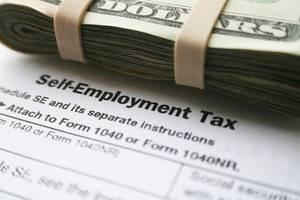What Are My Self-Employed Tax Obligations?
 While no one enjoys doing so, everyone has to pay taxes. For many people, taxes are automatically withheld from their paychecks by their employer, and their primary concern is filing their annual tax return. However, paying taxes can become more complicated for small business owners and those who are self-employed. These individuals should be sure to understand the best way to meet their tax obligations in a way that allows them to maintain financial security.
While no one enjoys doing so, everyone has to pay taxes. For many people, taxes are automatically withheld from their paychecks by their employer, and their primary concern is filing their annual tax return. However, paying taxes can become more complicated for small business owners and those who are self-employed. These individuals should be sure to understand the best way to meet their tax obligations in a way that allows them to maintain financial security.
Concerns for Self-Employed Taxpayers
A person is considered self-employed if he or she is the owner of a sole proprietorship, if he or she works as an independent contractor, or if he or she otherwise operates his or her own business. People who are self-employed will not only need to file an annual tax return if they earn a net income of at least $400 in a year, but they must also make estimated tax payments on a quarterly basis.
The estimated taxes paid by self-employed individuals include income tax and self-employment tax. Self-employment tax consists of Social Security and Medicare taxes that would typically have been withheld by an employer from an employee’s income.
A self-employed person can determine the amount of his or her estimated quarterly taxes using Form 1040-ES (Estimated Tax for Individuals). The amount of taxes will be based on the income earned in the previous year, or his or her expected amount of income for the current year. After determining the amount of taxes to pay in a quarter, payment can be sent via mail or through the Electronic Federal Tax Payment System (EFTPS).
When filing an annual tax return, self-employed individuals should use Schedule C of Form 1040 to report their total profits (income earned minus expenses) or net loss from the previous year. A person who had expenses of $5,000 or less may file Schedule C-EZ. Self-employed people must also report the self-employment tax paid during the previous year by filing Schedule SE.
Contact a San Jose Self-Employed Tax Attorney
Determining the right amount of taxes to pay as a self-employed person can be a complicated process; however, taking steps to understand your requirements can help you minimize complications and avoid owing taxes in the future.
At John D. Teter Law Offices, we can work with you to ensure that you are reporting income and paying estimated taxes correctly, and we can help you understand whether you can realize some tax benefits by establishing a business structure such as an S-Corporation or LLC. Schedule a consultation with our San Jose, CA small business tax lawyer today by calling 408-866-1810.
Source:
https://www.irs.gov/businesses/small-businesses-self-employed/self-employed-individuals-tax-center









